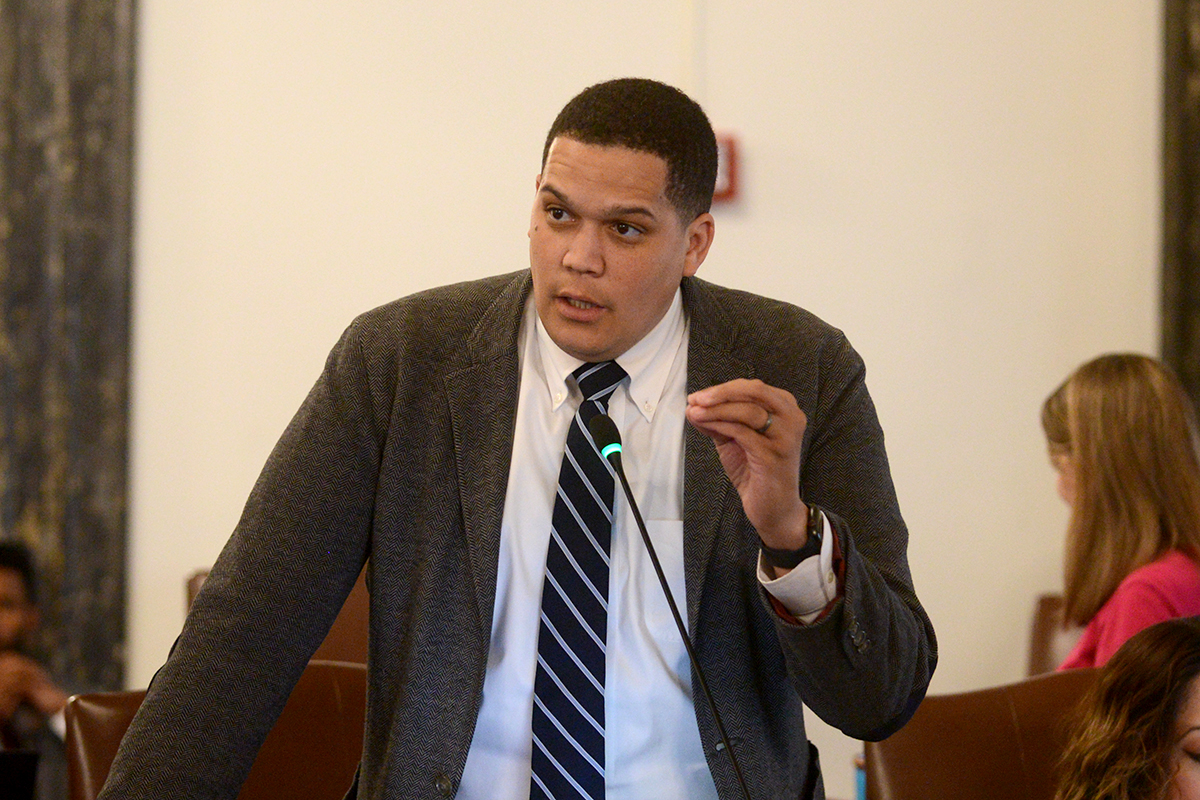- Details
- Category: Press Releases
Members of the Illinois Legislative Black Caucus applauded the Senate’s passage of the Fiscal Year 2024 budget agreement on Thursday.
“Earlier this year we set out a goal to pass a balanced budget that uplifts all Illinoisans with particular concern for low-income and working families. I commend my fellow legislators for advancing a budget that uplifts all communities instead of pitting needs against one another,” said State Senator Robert Peters (D-Chicago). “I am proud to stand behind a budget that uplifts public safety by investing $200 million for another round of grants for the Reimagine Public Safety Act.”
In addition to investments in the Reimagine Public Safety Act, the Black Caucus applauded educational investments included in the budget, including $350 million toward K-12 education and record funding for need-based financial aid to ensure students can afford college.
“A person’s educational success begins the day they are born. The quickest way to fail a generation is by failing to prioritize their education,” said Lightford (D-Maywood). “In Illinois, I am proud to say we took a positive step toward ensuring our students aren’t failed by an unjust system.”
The FY 24 budget builds upon the responsible spending decisions and balanced budgets passed by the General Assembly over the last five years, prioritizing education, workforce development and more.
“I am proud of the important steps this budget takes to continue the work we have done to put Illinois on sound fiscal footing,” said Senate Appropriations Chair Senator Elgie R. Sims, Jr. (D-Chicago). “The budget takes positive steps toward investing in disenfranchised communities, addressing the root causes of violence and funding vital services. I am proud of our commitment to fight for a budget that puts families and communities first, addresses historical disinvestments and builds stronger generations for years to come, all while being good for Illinois taxpayers.”
The budget heads to the governor for final approval.
- Details
- Category: Press Releases

SPRINGFIELD – State Senator Robert Peters (D-Chicago) released the following statement in response to the state budget passing the Senate:
“Funneling resources into programs that meet the urgent needs of our communities symbolizes Illinois’ commitment to building a future for all people, regardless of their ZIP code. I’m glad to see continued investments in housing, such as $350 million toward the HOME Illinois program to combat and prevent homelessness through supportive housing, rental assistance and workforce development opportunities. The continued investments in the Reimagine Public Safety Act and public safety measures outlined in this budget will create a safer state for all Illinoisans.”
“There have been many conversations about young people and creating safe spaces for them to thrive. Investing resources into youth employment opportunities is an example of appropriate structural change needed instead of surface-level conversations that offer no solutions. The additional investments in youth employment will boost the next generation and support working families.”
- Details
- Category: Press Releases

“I often hear unfortunate stories of temporary workers who were harmed by hazardous materials at their jobsite. Working in a safe and healthy environment is a human right,” said Peters (D-Chicago). “This measure increases safety and transparency for temporary workers while also instilling long overdue compensation for their work, which is often taken for granted.”
Under current law, the Day and Temporary Labor Services Act imposes stipulations for staffing agencies such as providing transportation and safety equipment to workers, providing an itemized list of wages due to workers and maintaining records related to third party clients.
House Bill 2862 dictates that temporary laborers assigned to a third party client for more than 90 days will be paid no less than the rate of pay and equivalent benefits as the lowest paid hired employee of the client with the same level of seniority and performing the same or substantially similar work.
The measure also requires agencies to notify laborers that the assigned workplace is where a strike, lockout, or other labor trouble exists and that the laborers have a right to refuse the workplace assignment.
“Expanding the Day and Temporary Labor Services Act is critical to addressing the unacceptable and rising workplace difficulties Black and Brown workers face,” Peters said. “Illinois is a pro-labor state that takes workplace safety and equitable pay seriously. We have proven that again today by passing this bill that not only sets the bar nationally for temporary worker protections, but provides regulators with the tools they need to ensure industry-wide compliance with the law. I would like to thank the Chicago Workers Collaborative, the Illinois AFL-CIO and State Representative Edgar Gonzalez for their hard work and determination to increase safety for temporary workers.”
House Bill 2862 passed the House Friday.
- Details
- Category: Press Releases

“Requiring criminal background information when it can’t be used against an applicant for licensure opens the floodgates for those with prior justice system involvement to experience discrimination based on the negative biases associated with a criminal record,” said Peters (D-Chicago). “Individuals with prior justice system involvement should be able to move on with their lives, instead of being defined by past mistakes.”
Under current law, the Illinois Department of Financial and Professional Regulation may consider mitigating factors and evidence of rehabilitation contained in an applicant's record after finding that the applicant for a license, certificate, or registration was previously convicted of a felony or misdemeanor.
House Bill 2826 prohibits inquiry into criminal history by IDFPR if the licensing statute states that criminal history cannot be used against an applicant. With this new prohibition, IDFPR would only need to perform a mitigating factor analysis in limited circumstances.
“People are more than their past mistakes,” Peters said. “If knowing a person’s criminal history won’t impact their licensing application, then this question only serves as a barrier.”
House Bill 2826 passed the Senate Friday.
More Articles …
Page 33 of 85





